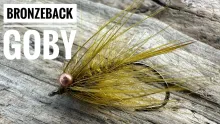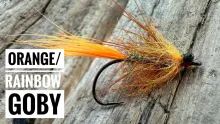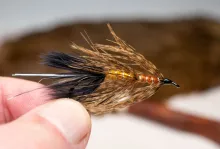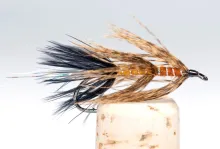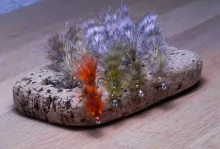Combine the Danish killer patterns Frede and Copper Bully with a Woolly Bugger... Not surprisingly a deadly combination
The Woolly Bugger is widely hailed as a true, universal killer pattern. A majority of flyfishers would probably choose a Bugger if they had to choose one fly for all types of fishing: stream, lake, fresh, salt. It's truly a killer.
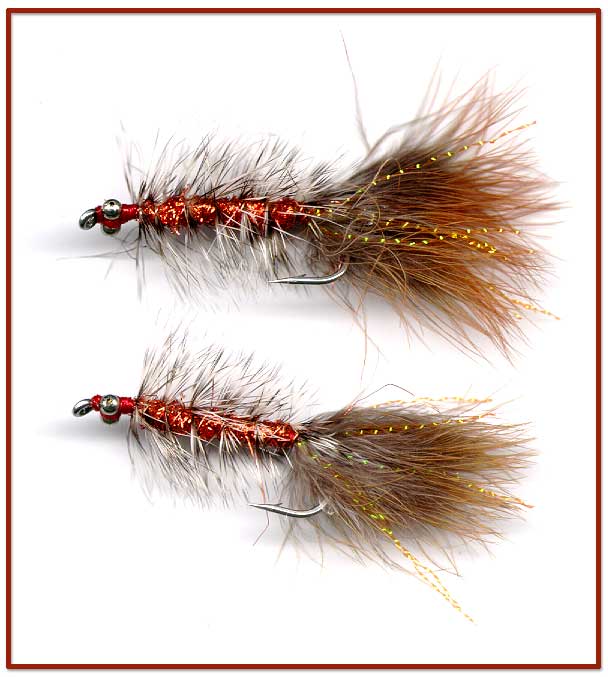
Copper runs in the family
Three is better than one
The Danish salt water fly Frede (try pronouncing the word 'fraithe' and you're almost there) is a standard in many Danish fly boxes. Like many universal patterns it's a Woolly Bugger derivate. It has its twists, but most tyers would group it with the buggers.
Lately a very simple copper pattern has gained quite a reputation. The Copper Bully (Kobberbassen) is merely copper dubbing on a hook, but does a very good job of imitating a small gammarid crustacean - and catching trout.
What if you combine these? Tie a Frede on a Copper Bully so to say? Well I tried, and got a Copper Frede, which has served me very well since the beginning of this year.
How to fish it
The Copper Frede can be used for most trout species and will probably work fine for bass and other species. Notice the smilarity with the Bob Root's and Tony Spezio's Chili Peppers - a proven bass pattern.
The Copper Frede can be used for the same purposes. It's developed for salt and has already taken sea trout, cod and garfish. But it will also serve you fine as a universal stream pattern.
There's not much to it: fish it as you would any Woolly Bugger. This fly penetrates the surface and goes down, som a fairly fast retrieve is not a bad idea. You can also let it sink and go close to the bottom.
I use a floating WF line or a neutral shooting head and a 0.23 millimeters (2X) tippet on a 3 meter (9') leader on a 5 wt rod. I spite of the weight of the fly it casts very well.
Materials
| Hook | Kamasan B175 or similar strong, down eye streamer hook. Sizes 2-10. |
| Thread | Red |
| Weight | Thine lead wire or simiar |
| Tail | A few straws of flash and a couple of dark red Golden Phesant rump feather |
| Rib | Copper wire |
| Body | Copper dubbing (SLF, Angel Hair or similar) |
| Hackle | Grizzly saddle |
| Eyes | Chrome bead chain |
| Head | Tying thread, optionally dubbed with rabbit or body material |
Instructions:
- Start the thread on the rear section of the hook
- Cut off a 7-10 cm (3-4') piece of lead wire
- Twist the wire on the shank to cover the front two thirds of the shank, leaving a couple of eye widths of bare shank
- Cover the lead with tying thread, ending up over the hook bend
- Varnish the lead
- Tie in the flash on the rear of the hook
- Select two large fluffy rump feathers from a Golden Phesant
- Leave all plume on the feathers
- Set one feather on each side of the hook, each reaching a full shank length behind the hook bend
- Tie the feathers down and cover the stems and plume to the front of the lead
- Bend the stems back and cover the doubled stems with tying thread
- Cut surplus
- Tie in the ribbing under the body
- Dub the thread with copper dubbing

The head can be covered with tying thread or dubbing material. - Form a cylindrical body reaching th front of the lead and feather stems
- Tie in the hackle, stem first, away from yourself, shiny side pointing forwards
- Take one full clockwise turn with the hackle right in front of the body
- Wind the hackle to the rear of the fly in 5-7 open turns
- Catch the hackle with the rib and tie it down with 5-7 anti-clockwise turns of ribbing
- Tie down the ribbing right in front of the body and wiggle till it breaks
- Take the full length of bead chain and tie in the first pair of beads under the hook shank in front of the body.
- Cut the rest of the chain off using pliers
- Cover the base of the eyes with a criss-cross of tying thread.
- Varnish between the eyes
- Form a head from the tying thread
- Varnish
- Log in to post comments

